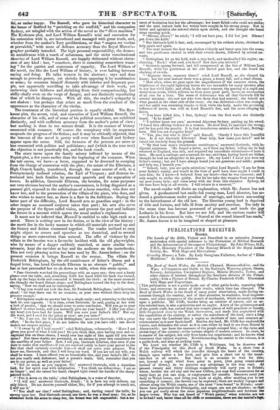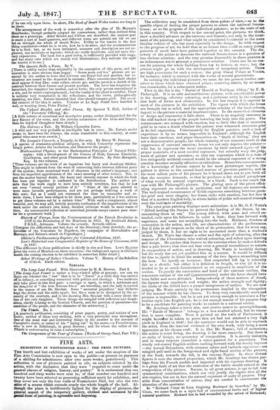PUBLICATIONS RECEIVED.
BOOKS.
The Lands of the Bale, Visited and Described in an extensive Journey undertaken with special reference to the Promotion of Biblical Research and the Advancement of the cause of Philanthropy. By John Wilson, D.D., F-R.S., Honorary President of the Bombay Branch of the Royal Asiatie Society, &c. With Maps and Illustrations.
Grantley Manor; a Tale. By Lady Georgians Fullerton, Author of "Ellen Middleton." In three volumes.
The Book of South Wales, the British Channel, Monmouthshire, and the Wye; a Companion and Guide to the Railways, Watering-places, Shores, Scenery, Antiquities, Unexplored Regions, Mineral Districts, Towns, and other objects of interest throughout the Southern division of the Princi- pality: with a Picture of Bristol. By Charles Frederick Cliffe. Illustrated with Maps and Engravings. [This publication is not a guide made out of other guide-books, repeating their errors, and erroneous in many of their truths, which time has changed. The Book of South Wales is the result of many years' observation, made during ex- cursions through the country, and of that attention to statistics, local improve- ments, and other symptoms of the march of mechanics, which necessity enforces upon a publicist- Mr. Cliffe, besides being an admirer of nature, and an ac- tive-minded man, is also a pedestrian and an angler. A love of the picturesque and of the gentle craft, has carried him into remote places of wild grandeur or beauty, little frequented even by the Welsh themselves and made him acquainted with the capabilities of the country, or rather the nakedness of the land, since a long day can carry the Londoner into a region as destitute of inns and creature ac- commodation as is poor Spain itself. Besides dry land, Mr. Cliffe has explored the waters, and delineates the coast as it is seen either by land or sea from Bristol to Aberystwith: nor have the manners of the people escaped him; or the ruins and archreology of the country; or the various elegies of modern science. In short, he is master of his subject, not only from books but experiment; and he knows what treatment that subject requires. Notwithstanding the matter in the volume, it IS a guide-book, and aims at nothing more. We know not whether Mr. Cliffe is a Welshman but he deserves well of the Principality for this Book of South Wales. In a short time a Welsh railway will whisk the traveller through the heart of the country, though upon rather a low level, and give him a short cut to the moun- tain-foot at all events. But there is no occasion to wait for this; nor, beyond a rapid whirl from point to point, (but going round-about instead of direct,) do we perceive any advantage in the iron road. At present twenty and thirty shillings respectively will carry you to Bristol; where, besides the old city and the new Clifton, you may find amusement for as many days as you can stop, or employment for months. Steamers carry you daily to Welsh towns, and bring you back at night, after enabling you to see something of scenery ; the Severn can be explored; there are weekly voyages and oftener along the Welsh coasts, one of the most " iron-bound " in Britain; omni- buses have penetrated the Principality, and stages are not yet obsolete; so that you can get easily about the more populous neighbourhoods and between the larger towns. Who has not heard of "Welsh ponies," when vehicles are not , to belied? and, better than all for cliffs or mountains, there are the tourisfalegs,
if he can rely upon therm In short, The Book of South Wales makes one long to be there.
The arrangement of the work is somewhat after the plan of Mr. Murray's Handbooks; though probably adopted for convenience, rather than derived from them as a prototype. After Bristol and Clifton are described, the ancient port is made a sort of head-quarters, and different tours are pointed out till we are led on through the whole of South Wales. Utility to the tourist is the first thing considered—what he is to see, how he is to move, and the accommodation he is to find: but, as we have intimated, manners and description are not ne- glected, nor incidents or legends; which are really traditions, and not mere lite- rary expansions. The book has a good index, is sufficiently provided with maps, mad has many cuts which are mostly real illustrations; they indicate the sight the tourist is to see.] The Queen's Ball; a Poem. By V. [There is oddity rather than originality in the conception of this poem, and the execution is more obvious than happy. "Seven score and ten" persons are as- sumed by the author to have died between one Royal ball and another, but in-
vitations are issued to the departed in mistake: Pluto consents that their shades shall appear if they like; some refuse, others go; and the poem is a sketch of the
contrast between their former and present position. The lover has forgotten his betrothed, the daughter her mother, and so forth: the only person remembered is a wit, and he rather contemptuously; but the vanity of the ghost is satisfied. There is nothing very remarkable in the reflections; and the views, philosophically speaking, are false. Nature intended that time should conquer grief. The eseen- nal element of the idea is satire. Voltaire or Le Sage would have handled it well, or wanting them, Peter Pinder.] The Upland Banded, and other Poems. By Spencer T. Hall, Author of the "Foresters' Offering," &c. [A little volume of occasional and descriptive poems, rather distinguished for.the easy fluency of the verse, and the obvious naturalness of the ideas and images, than for depth of thought or force of style.] The Heiress; a Tale. By William Champion Eaton. I A wild and not very probable or intelligible tale in verse. Mr. Eaton's model seems to have been the Giaour, the scene transferred to this country, at some period when men wore swords.] The League's Convert; a Tragedy, in five acts. By Henry W. Pearson. LA species of dramatico-political allegory, in which Conserver represents the kingly power, Aristos the exclusives, and Democres the people.] Mathematical Physics; or the blathematical Principles of Natural Philo- sophy: with a Development of the Causes of Heat, Gaseous Elasticity, Gravitation, and other great Phsenomena of Nature. By John Ilerapath, Esq. In two volumes. [These volumes are the work of an ingenious but hasty and desultory thinker. This might he inferred from the want of connecting links between different parts of the system; from occasional want of clearness in the author's language; and from his imperfect apprehension of the exact meaning of other writers. But, to put the matter beyond doubt, the hasty and slovenly manner in which his book has been put together is confessed in the Introduction. The author ad- mits that the work ought to have been entirely rewritten, but that he has not even "reread several portions of it." " Some of the parts alluded to were mere juvenile performances, and are not perhaps befitting a work of this sort; but as I could not command the time to reconsider and re- write them, I have been obliged to let them pass, particularly as I was anxious to get these volumes out by a certain time.' With such a complacent, almost boastful, and, we may add, strictly accurate confession of the imperfections of the work under the author's own hand, detailed criticism would be mere waste of time. An unconnected collection of unrevised juvenile essays cannot pass mus- ter for a systematic work] Historg of Europe, from the Commencement of the French Revolution in 1789 to the Restoration of the Bourbons in 1815. By Archibald Alison, F.R.S.E., Advocate. Volume the seventh. Seventh edition. [Contains the difficulties and last days of the Directory; their downfall; the ac- quieitien of the Consulate by Napoleon the campaigns of Hohenlinden and Marengo, and Nelson's attack on Copenhagen.] 011ivier's Parliamentary Register for Contested Elections, 1847. Low's Historical ana Comparative Register of the Rouse of Commons,1841 to 1847.
[The difference in these publications is chiefly in size and form. Low's Register gives the votes of Members on three occasions: the rulings and spaces in Offivier's enable the coming election to be exhibited in somewhat tidier detaiL] Select Writings of Robert Chambers. Volume V. History of the Rebellion of 1745-6. Sixth edition.
SERIALS.
The Long-Lost Found. With Illustrations by H. K. Browne. Part L [The Long-Loot Found is rather a long-winded affair at present; nor can we take out whether the " lost " that is to be " found' is a child that was carried off in infancy, or something connected with polities and theology. Two incidents only take place in this first part: a carriage is upset, in which a nobleman and his daughter of "the true Norman blood" are travelling, and the lady is carried to the manse of one Dr. Sinclair. Some 'ancestral prejudices" had hitherto kept the divine and the noble apart; but these seem to be dissipated by the ue- cessity of the overturn, and in the morning Mrs. Sinclair tells a story about the kiss of her only daughter. These things are mingled with reflection and disqui- sition, chiefly relating to the Scottish Church, and the question of questions—the condition of the people, and the character of the aristocracy.] The Thistle. No. I.
[A quarterly publication, consisting of prose papers, poetry, and notices of new books; neither of them very striking, with a very provincial tone throughout. One of the most real and interesting things in the number is the account of Campbell's death, or rather of his "laying out" by his nurse —a Frenchwoman, who is now in Edinburgh, in great distress; and for whom the editor of the Thistle 113 endeavouring to raise a subscription.]
The Conzpasion of the Tour of France. (Works of George Sand, Part VII.)



























 Previous page
Previous page